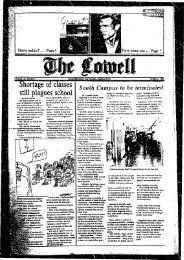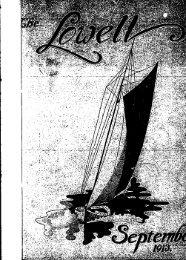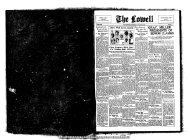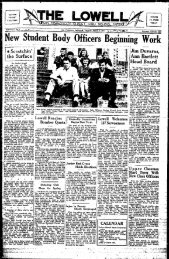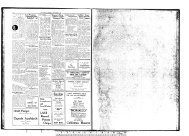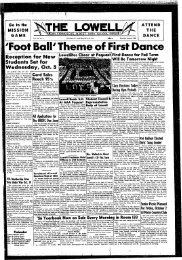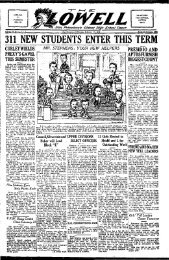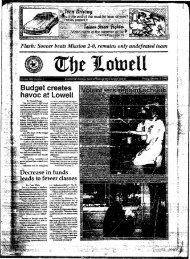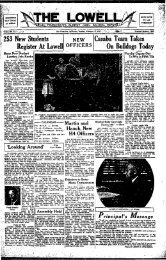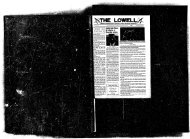Severely handicapped class arrives - The Lowell
Severely handicapped class arrives - The Lowell
Severely handicapped class arrives - The Lowell
You also want an ePaper? Increase the reach of your titles
YUMPU automatically turns print PDFs into web optimized ePapers that Google loves.
Alcoholic beverage<br />
Should they be<br />
(raop.<br />
* *<br />
,!, tlun H wr- armiri<br />
rWwork ukifcui carries more than 5.000 fcxr and vrfoc »d»«r.<br />
Utcmaiu Tftry year.<br />
What do these first four su&ttcs<br />
have lo do with the fifth statistic?<br />
According to Comprehensive Care<br />
Corporation, a private company that<br />
specializes in pravUiog alcohol anti<br />
drug abuse program*. "Exposure u><br />
alcobol advertising has been fount<br />
to influence young people.**<br />
With this In mind, acveral national<br />
groups are incrcatlrg<br />
pressure for a ban on alcohol advertising<br />
on television and radio.<br />
Claiming thai the broadcast advittiscments<br />
influence mo>e pcopie.<br />
especially minors, to drink alcobol,<br />
the lobbying groups are stating taat<br />
the health and safjty of the Ancri;an<br />
society should be placed before my<br />
industry** right to commercial<br />
advertisement*<br />
In response lo these prcsuirc<br />
groups, the alcoholic beverage<br />
sumption Icaris to greater intoxication<br />
ud greater health problems.<br />
<strong>The</strong>re has oot been conclusive<br />
evidence to prove or disprove the<br />
point, however. As Dr. Michelle A.<br />
Wolf of the Department of Broadcast<br />
Communicatiofts Arts at San<br />
Francisco State *Inivenrt> (SFSU)<br />
stated. "Tecnigen definitely learn<br />
from what they see and hear. But<br />
what they do in terms of behavior is<br />
almos< impossible to determine.<br />
You can't talk about that unless the<br />
environment and the family life of<br />
the person is taken into account.<br />
<strong>The</strong>se cause-effect notions (hat people<br />
have are too simptutic. TV<br />
doesn't have as much powef as pov<br />
pie believ; it docs."<br />
According lo Wolf, product! can<br />
be K>ld on two different levels. <strong>The</strong><br />
first level U a functional level, with<br />
"<strong>The</strong> glamorous and glorified images<br />
of alcohol use are misleading<br />
impressionable young people into<br />
believing that alcohol is associated<br />
with success in ssx, sports,<br />
business, ami friendships."<br />
manufacturing todusny nod the<br />
broadcast industry arc joining forces<br />
to oppose the ban. For these groups,<br />
it b more than a question of health<br />
or free speech.<br />
For the brewing industry, a ban in<br />
commercial advertisements could<br />
mean a drop in the numrcr and the<br />
.•ate of purchasing of the* t products.<br />
In oiher words, if the proposal succeeds,<br />
the beer and wine companies<br />
could lose millions of dollars in<br />
fcvsrues.<br />
For the television and radio indestries,<br />
the proposal would effect a<br />
lota of more than S7J0 million in<br />
advertising. Alcoholic beverage<br />
f»m,... ,-j.u ,„ the single largest<br />
product advertisers on television.<br />
giving networks etjbt percent of the<br />
commercial viewing time. <strong>The</strong>y also<br />
account for 3.5 percent of total<br />
television advertising rev&ues and<br />
li percent o? radk> reverses.<br />
IN ra^or qocaion at band is<br />
whether or not advertising on teJcvisioa<br />
ml radio affccti the audiences<br />
and encourage* them lo drink<br />
alcohot. If this allegation can be<br />
" proven, then the advertising would<br />
be ooonected to Incttmsed health and<br />
death risks, she* increased coo-<br />
a commercial proclair.-infj «hat the<br />
product docs for its u»c.\ An exame'e<br />
of this would be dishwashing liquid.<br />
<strong>The</strong> advertiser of Sparklcan<br />
dishwashing liquid would icll its audience<br />
that Sparkkan washes dishes<br />
faster, better, and more permanently<br />
than other brands do.<br />
<strong>The</strong> iccond level of advertising is<br />
that of abstract value. Th!> type of<br />
advertising acts on the basic needs<br />
and wants of all consumers. <strong>The</strong><br />
product U displayed as leading to a<br />
better and more successful life. Thz<br />
correlating example would be a<br />
commerctil that shows a beautiful,<br />
young housewife thai uses<br />
Sparklcan to clean a week's worth<br />
of dishes in fivemimnesaad because<br />
of the wonderful product has a lov*<br />
ing husband, charming children.<br />
and always wins «the bridxe club.<br />
Abstract value advertising does not<br />
work on an explicit level: it relies<br />
more on implying certain things<br />
rather than stating them outright.<br />
A major auction of the proponents<br />
of the ban is that CK<br />
alcoholic beverage commercials are<br />
not advertised on the functional<br />
level, but nther only on the abstract<br />
value level. Most televisioo com-<br />
Fim! Your Lovely CUU "<br />
LUCKY STAR GIFTS<br />
iJEWELRYSHOP<br />
Tnmfannel Type» ofTojl<br />
&CaM»fcP>*iiiacl><br />
. ...udMore!<br />
2M2Irraf<br />
Between 22nd* 23 rd Avo.<br />
•. ,'Tcfc:7»-W25<br />
77ir lo»rl/. MarJi 3, 198). ff IS<br />
•IN DEPTH<br />
commercials:<br />
banned from the air?<br />
merciih don't emphasize the tasu<br />
and cffecti of drinking: rither the)<br />
show people enjoying life and drinking<br />
alcohol.<br />
George Hacker. Ihc national coordinator<br />
of Project SMART - Slop<br />
Marketing Alcohol on Xadio and<br />
Telcvtjon — a major advocate of<br />
the propmed ban, taid. "<strong>The</strong><br />
glamorous and glorified images of<br />
alcohol oie are mit'eading impressionable<br />
younjt pcriplt into bcliev Dg<br />
th« alcohol n assovivtcd wUh sue<br />
ccsi in sex. ipmii. His'nes*. and<br />
friendships."<br />
As Wolf pointed out. if advertisers<br />
for Leer and wine advertised<br />
on the functional level and showed<br />
what bappcaal after people used<br />
their product*, alcohol would not<br />
look as appealing. A drank driver<br />
advertising a beer would tut be as<br />
succevsful as an attractive >uppic<br />
would. Wolf commented, "If you<br />
showed the effects, you'd look like a<br />
fool."<br />
Certain groups pushing for the<br />
pasting of a ban arc especially concerned<br />
about commercials in which<br />
celebrities appear who may have a<br />
large Influence on young audiences.<br />
Arnold Fecc of the National Parent •<br />
Teacher Auociation expressed the<br />
contention that the advertisemenu<br />
are "directed at young people who<br />
cannot drink."<br />
"Young people are particularly<br />
affected by alcohol endorsements by<br />
athletes or entertainers." according<br />
to the Comprehensive Care<br />
Corporal km.<br />
If this b the ca*r, the commercials<br />
would be encouraging tccnigers nuc<br />
only tu drink, bu: to break the law<br />
by drink. n| alcoholic beverage*.<br />
With the new law Uiat iv iniendc-1 to<br />
•.umJanluc the drinking age nationally<br />
at 21. ihii would aifeci a<br />
greater proportion of the nation's<br />
youth.<br />
Again the comention cannot be<br />
proven so we arc left with an ongoing<br />
debate. Advertisers contend that<br />
iheir commercials are only meant to<br />
"introduce new products" and<br />
"gain* larger share of the market."<br />
T*y point out that there has been<br />
no causal connection prmen between<br />
broadcast advertisements and<br />
increased consumption of alcohol.<br />
<strong>The</strong> broadcauers and alcoholic<br />
beverage producers adamantly<br />
rtfiuc to allmv the industry to be put<br />
under any limit ur ban. Doci.'tl B.<br />
Shea, president of the United State*<br />
Brewers Association stated, "To<br />
hav- a legitimate product removed<br />
from a legitimate medium is inappropriate.<br />
It is the same as saying<br />
because 50,000 people are killed in<br />
auto accidents each year you should<br />
ban automobiles advertising."<br />
Professor John Tcnj-e of the<br />
«33 Uascn su u Anton<br />
&U1FHK1KO.CAM112<br />
Department jf Management and<br />
Marketii.; K. SFSl 1 corntnented that<br />
tne cootentiom of the proponents of<br />
the ban are " ridicule a." He ex*<br />
plained. "It depends on us.* or<br />
mUuse. <strong>The</strong>y say people are going<br />
out and getting intoxicated. Sensible<br />
teenagers don't do those kinds of<br />
tilings! People are looking for easy<br />
answers and they don't »tu."<br />
industries havn refused to pay for<br />
such a propose]. "If you say that<br />
counter-ads are necessary, you<br />
assume that the problem is related to<br />
advertising." said Donald Weber or<br />
the CBS Broadcasting Group. "We<br />
don'r think that is the case."<br />
Presently, the broadcasters do<br />
follow certain voluntary restriction<br />
imposed upon themselves. Hard liquor<br />
is nut advertised oo tdevmcu<br />
and radio, only beer and wine are.<br />
Also, alcohclk beverage commercials<br />
do not show people actually<br />
drinking the beverage. <strong>The</strong>y show a<br />
full glass being raised and a half,<br />
empty glass being lowered, but<br />
never the act of drinking.<br />
<strong>The</strong> United States is not the only<br />
area in which this subject is under<br />
comroversy. Canada has Instituted<br />
limited bans in certain areas. In Ontario,<br />
commercial* dwt emphasize<br />
aicohol with a kurcenful<br />
"lifestyle" have been banned, and<br />
for 14 montru all advertising of<br />
alcoholic beverages in British Columbia<br />
was banned. In a third attempt.<br />
broidcMi commercials were<br />
banned in Manitoba. In none of<br />
"It is the same as saying because<br />
Tengc believes that the commercials<br />
don't influence people to<br />
drink. "I think mow people drink<br />
became ot their involvement with<br />
their peer group*," he Hated.<br />
Instead of a ban of all alcoholic<br />
bevenge commercials, some people<br />
arc proposing "counter*<br />
advertisements" showing the effects<br />
of alcohol consumption. <strong>The</strong> institution<br />
of such a program would be<br />
considered under the equal time<br />
clause of broukautLig of controver-<br />




